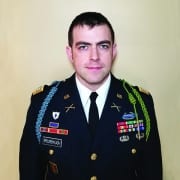Remarks in Honor of a Veterans Shabbat
Captain Aaron Brumbaugh is a member of Congregation Shaarey Zedek in Southfield, Michigan and of Charles Shapiro-MG Maurice Rose Post 510. He is a decorated U.S. Army Infantry Officer with two combat tours in Afghanistan. He graduated from the University of Michigan in 2010 as a member of Phi Beta Kappa and recipient of the George C. Marshall Leadership Award. He expects to complete his professional degree work at Wayne State University in December. He presented the following remarks at Congregation Shaarey Zedek’s annual Veterans Shabbat on November 7, which this year commemorated the 75th Anniversary of the end of World War II.
I am a former Captain in the United States Army. I deployed as an Infantry Platoon Leader on two deployments during Operation Enduring Freedom in Afghanistan with the “Blue Spaders,” the 1st Battalion of the 26th Infantry Regiment.
So, what is the significance of that affiliation?
In World War I, the “Blue Spaders” fought across France, winning more campaign streamers than any other unit in that war.
In World War II we were part of Operation Torch, assaulting and ultimately taking North Africa before crossing the Mediterranean and participating in the taking of Sicily during Operation Husky.
When it was time for the Allies to storm the Beaches of Normandy, the “Blue Spaders” were there as well, in the very first wave of the assault. They fought on from there, laying siege to the German city of Aachen, taking part in the Battle of the Bulge, and fighting into Czechoslovakia before the end of the war, earning the unit motto “Relentless Pursuit.”
We were there in Vietnam, and in the Balkan Wars deploying to Bosnia, Macedonia, and Kosovo. We were in Iraq in Samarra in the Sunni Triangle, and then in Baghdad, and then deployed multiple times to Afghanistan including the now infamous Korengal Valley, some of the hottest fighting of the Afghan war.
And on another note, according to Marvel Comics, Captain America himself was originally a “Blue Spader.” If you don’t believe me, feel free to Google it.
So why am I telling you all this? And why use the term “we” when, as some of you may already suspect, I was not personally at any of these battles of World War II?
Well, in the U.S. military and particularly in the U.S. Army, we understand the importance of our history. The institutions of today’s military were created and shaped by the heroes of the World Wars and the conflicts since then. We feel the echoes of their contribution through everything we do, every tradition, and every lesson learned through hard warfare. We train in tactics and procedures that were formed in the time of the World War. At times, we are even quartered for training in facilities that don’t appear to have been updated since World War II. But all this connects us to our units’ lineages and lets us feel the weight of trying to fill the footsteps of giants who came before us. All Jews are commanded to regard themselves as if they were personally brought forth out of the land of Egypt. Similarly, Soldiers feel a direct connection to their individual unit history. I am privileged to be part of the continuing story of the “Blue Spaders,” and all of today’s veterans in numerous battalions throughout the U.S. Army get to be part of similar stories. In all of these stories, the Second World War holds a place of special distinction. It forms the cornerstone of military education and training to this day. As young soldiers, when we learn about our unit histories, there is a very real sense of what incredibly big shoes we have to fill. So, I am here to express my gratitude as a soldier, for fighting a campaign the magnitude of which is almost unimaginable to me, even as it paved the way for the modern institution of the military which made me what I am today.
But as Jews, the significance of this war is even greater. The heroes of World War II are responsible for overturning a true existential threat to the Jewish people and stopping the greatest act of mass murder in modern history. American soldiers liberated five of the concentration camps and the American war effort was necessary for the liberation of the rest. The debt of gratitude of the Jewish people cannot ever be fully expressed or repaid. So again, I am here to try to convey my gratitude, this time as a Jew, for the gift of life given back to so many of our people.
And in addition to all this, there is another special significance of the Greatest Generation that I feel as an American. In the times we live in, it is almost unimaginable to think of society coming together and taking on such a herculean task as they took on. This generation emerged directly from the Great Depression and marched into one of the greatest wars ever fought. There was no excuse of hard times, just the country coming together and doing what needed to be done. Some of that sense of unity can be seen in the humble title “GI,” shorthand for “General Issue” or “Government Issue.” The Soldiers of World War II embraced the term GI, carrying connotations of being a small part of something much bigger. So again, I am here to express my gratitude, now as an everyday American, for showing us the way to put aside individual egos and do what you were called to do as part of something much greater, and for laying the template for the ideal of what it means to be an American.
Volume 74. Number 4. 2020




